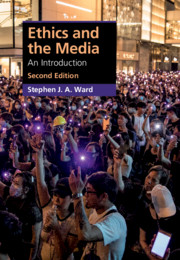Book contents
- Ethics and the Media Second Edition
- Cambridge Applied Ethics
- Ethics and the Media
- Copyright page
- Dedication
- Contents
- Introduction: Media Ethics in a Global Age
- 1 Doing Media Ethics
- 2 Reconstructing Media Ethics
- 3 Media, Engagement, and Democracy
- 4 Truth, Objectivity, and Fake News
- 5 Media Harm
- 6 Media and Extremism
- 7 Citizens, Media, and Macro-resistance
- 8 Global Media Ethics
- Bibliography
- Index
6 - Media and Extremism
Published online by Cambridge University Press: 22 October 2020
- Ethics and the Media Second Edition
- Cambridge Applied Ethics
- Ethics and the Media
- Copyright page
- Dedication
- Contents
- Introduction: Media Ethics in a Global Age
- 1 Doing Media Ethics
- 2 Reconstructing Media Ethics
- 3 Media, Engagement, and Democracy
- 4 Truth, Objectivity, and Fake News
- 5 Media Harm
- 6 Media and Extremism
- 7 Citizens, Media, and Macro-resistance
- 8 Global Media Ethics
- Bibliography
- Index
Summary
The rise of intolerant groups using media to publish images and stories about vulnerable groups creates a special problem for media ethics.
Extremism leads to serious media harm, including unjustifiable profound offence. The more that extreme messages are circulated, the greater likelihood that citizens, frustrated by slow-moving moderate politics, may adopt more extreme “solutions” to complex problems. Dialogic democracy wanes.
- Type
- Chapter
- Information
- Ethics and the MediaAn Introduction, pp. 157 - 180Publisher: Cambridge University PressPrint publication year: 2020

